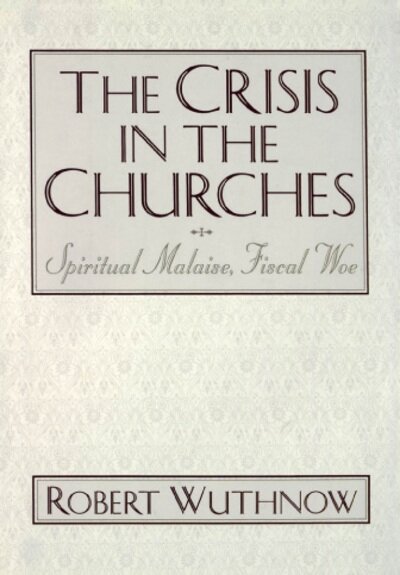Robert Wuthnow, The Crisis in the Churches: Spiritual Malaise, Fiscal Woe. Oxford University Press, 1997.
Referenced in: Giving and Financial Stewardship
LifeandLeadership.com Summary
In a tone similar to Loren Mead in Financial Meltdown in the Mainline, Wuthnow, the renowned sociologist of religion, argues that churches do very little to equip their people spiritually, educationally, or administratively to provide financial support for mission. He insists that while the survival of Christianity in America is not at stake, its ministries will become increasingly sluggish unless congregations talk more boldly and directly about money. His 2,000-plus interviews reveal, however, that ministers are much too timid, not only in this subject, but also about how faith should transform members’ involvement with career, stewardship, giving, and social justice. Of special interest is chapter three, “The Spiritual Dilemma of the Middle Class,” the social grouping that provides the vast majority of financial support but who feel that the church facilitates little connection with their lives. Wuthnow suggests ways to connect with this group in the workplace, and how to inculcate the “gospel of giving” to address the overall needs of ministry, with particular emphasis on serving the poor and others who suffer from economic injustice.
From the Publisher
At a time when already overworked clergy are being called upon by budget cutting politicians to do more for the poor, the sick, and the elderly, American churches are suffering persistent financial shortfalls. In fact, contrary to popular media images of millionaire televangelists, America’s churches are cutting back programs and staff, clergy salaries are stagnating, and many parishes are having trouble raising enough money to keep the church lit and heated on Sunday. Why are America’s churches in financial distress? Robert Wuthnow, a leading commentator on religious life in America, asserts that the steady drop in donations, volunteering, and personal involvement is a direct result of a spiritual crisis a crisis caused in large part by the clergy’s failure to address the vital relationships between faith and money, work, stewardship, giving, and economic justice.
In The Crisis in the Churches, Wuthnow offers a searching study of this financial crisis and of the spiritual vacuum that has silently grown worse during the past decade. To do this, he lets the churches speak for themselves, quoting extensively from interviews with clergy and laity in sixty Protestant and Catholic congregations throughout the U.S., and drawing from the texts of over 200 sermons, from church financial records, and a national survey. What emerges is that parishioners often feel the church does not care about what they do from Monday to Friday, offers no guidance in their most pressing day to day concerns, yet always seems to be asking for more money. Clergy, for their part, say they hesitate to talk about finances because they know “the money question” makes people uncomfortable. But failure to raise the subject often makes it necessary to cut the very programs and services that middle class parishioners desire and would support. Wuthnow argues that in order to survive, churches must find ways to minister to the economic concerns of their own middle class parishioners. Indeed, of every $1,000 received by churches, $900 comes from people who work in middle class occupations. Clearly, anything that motivates middle class members to become more involved will strengthen a church’s financial well being and capacity to serve its people. Although the situation is critical, Wuthnow finds much cause for hope. He points to ideas and programs that some churches have enacted to challenge their members to think differently about work and money and giving. Parishioners sometimes respond positively when clergy speak boldly and concretely about matters of faith and finance, and some churches have formed small groups whose members meet regularly to discuss issues of spirituality, work, personal finances, and stewardship.
A serious and sympathetic examination of the crisis behind the stained glass, this thought-provoking volume will be highly valuable both practically and as moral support to clergy, parishioners, and anyone else concerned about restoring vitality and significance to American churches.
About the Author
Robert Wuthnow is the Gerhard R. Andlinger Professor of Sociology at Princeton University. He has published widely in the sociology of religion, culture, and civil society. His recent books include After the Baby Boomers: How Twenty- and Thirty-Somethings Are Shaping the Future of American Religion; America and the Challenges of Religious Diversity; and Saving America? Faith-Based Services and the Future of Civil Society. He is currently working on a book tentatively titled Boundless Faith: The Global Outreach of American Churches.
***For additional information on this resource, including reviews, click the bookstore links. Check the reference at page top or the links below for resource guides on related topics.***
Other Ministry Resource Guides on Giving and Financial Stewardship:
See Resources on Over 100 Areas of Ministry Leadership:


